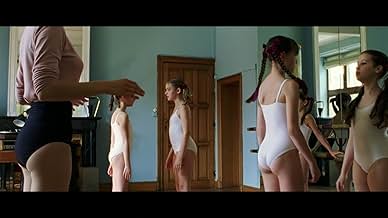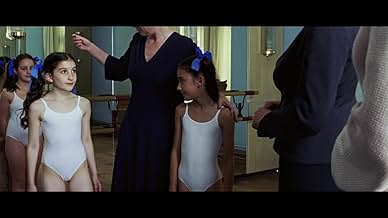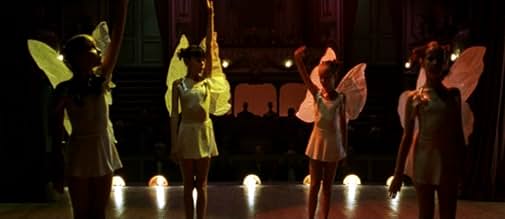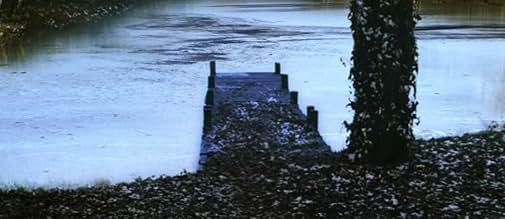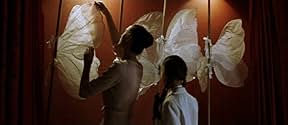IMDb RATING
6.8/10
6.8K
YOUR RATING
A look inside an offbeat boarding school for young girls.A look inside an offbeat boarding school for young girls.A look inside an offbeat boarding school for young girls.
- Director
- Writers
- Stars
- Awards
- 8 wins & 2 nominations total
- Director
- Writers
- All cast & crew
- Production, box office & more at IMDbPro
Featured reviews
The final title, "for Gaspar" (Noe, director of IRREVERSIBLE), hints at the pedigree of the makers of this quite fascinating study of young girls on the cusp of adolescence.
Benoit Debie, the cinematographer of IRREVERSIBLE, shot the film.
Six year old Iris (Zoe Auclair) arrives at her new country school in a coffin. She becomes infatuated with twelve-year-old Bianca (Berangare Haubruge) who disappears each evening and returns in the morning. The girls spend most of their days studying ballet and preparing for an important exam.
The school is like a keep. The girls are encouraged to find happiness in obedience. Parents never visit. The world beyond its tall hedges exists like something within a dream.
Director Lucile Hadzihalilovic imbues every aspect of the film with a dreamy, meditative veneer. Shots of the pre-teen nymphs dancing, cartwheeling and splashing about in shallow water recall the grainy erotic imagery of David Hamilton's early feature films -- in particular, LAURA and BILITIS. The ballet sequences and striking compositions of solitary female figures in towering external landscapes owe a small debt to Dario Argento's SUSPIRIA and, to a lesser extent, his PHENOMENA. But this is not a deliberate softcore meditation on childhood sexuality. It is a metaphorical examination of how innocence is ruptured by its own curiosity.
The camera angles stress the importance and prominence of legs to a fetishistic degree. This focus is an organic extension of the girls' ballet training; a darker purpose for legs is indicated later in a chilling line of dialogue. Debie's cinematography emphasizes light and shade and is never pretty for its own sake.
The forest filled with lamps has a deliciously surreal, fairytale quality. The sequences where the girls dance for a faceless audience reminded me of one of MULHOLLAND DRIVE's most haunting sequences. The film's sound design also echoes the internal voids of the Lynchian world.
The film is not big on explanations and is a touch too slow at times, but it presents a thoroughly realized universe that is a stark metaphor for life's discoveries and disappointments. The performances possess perfect pitch and the tone remains both haunting and consistent.
What exactly is the film about? The girls may be in a purgatory of sorts, a resting place between life and death. Perhaps not. Perhaps they are in a holding pattern between childhood (innocence) and adulthood (a state requiring some loss of innocence), and when they manage to escape (succumbing to their pre-adolescent curiosity), they have forfeited their place in childhood forever. But only perhaps.
Benoit Debie, the cinematographer of IRREVERSIBLE, shot the film.
Six year old Iris (Zoe Auclair) arrives at her new country school in a coffin. She becomes infatuated with twelve-year-old Bianca (Berangare Haubruge) who disappears each evening and returns in the morning. The girls spend most of their days studying ballet and preparing for an important exam.
The school is like a keep. The girls are encouraged to find happiness in obedience. Parents never visit. The world beyond its tall hedges exists like something within a dream.
Director Lucile Hadzihalilovic imbues every aspect of the film with a dreamy, meditative veneer. Shots of the pre-teen nymphs dancing, cartwheeling and splashing about in shallow water recall the grainy erotic imagery of David Hamilton's early feature films -- in particular, LAURA and BILITIS. The ballet sequences and striking compositions of solitary female figures in towering external landscapes owe a small debt to Dario Argento's SUSPIRIA and, to a lesser extent, his PHENOMENA. But this is not a deliberate softcore meditation on childhood sexuality. It is a metaphorical examination of how innocence is ruptured by its own curiosity.
The camera angles stress the importance and prominence of legs to a fetishistic degree. This focus is an organic extension of the girls' ballet training; a darker purpose for legs is indicated later in a chilling line of dialogue. Debie's cinematography emphasizes light and shade and is never pretty for its own sake.
The forest filled with lamps has a deliciously surreal, fairytale quality. The sequences where the girls dance for a faceless audience reminded me of one of MULHOLLAND DRIVE's most haunting sequences. The film's sound design also echoes the internal voids of the Lynchian world.
The film is not big on explanations and is a touch too slow at times, but it presents a thoroughly realized universe that is a stark metaphor for life's discoveries and disappointments. The performances possess perfect pitch and the tone remains both haunting and consistent.
What exactly is the film about? The girls may be in a purgatory of sorts, a resting place between life and death. Perhaps not. Perhaps they are in a holding pattern between childhood (innocence) and adulthood (a state requiring some loss of innocence), and when they manage to escape (succumbing to their pre-adolescent curiosity), they have forfeited their place in childhood forever. But only perhaps.
Those who expect a straightforward plot with all the answers from Innocence will be disappointed. However, this "open for interpretation" is the strength of the film. This personal interpretation without doubt varies whether the viewer is male or female, child or an adult. Obviously a film about young girls opens differently to women/girls, who can possibly feel similarity with the characters, than to a male viewer who watches the set from the outside - from the darkened audience.
Personally, I saw the film as a demonstration how alien is the world of grown ups to children and how unexplainable many things remain. The film that is clearly shot from the viewpoint of the children and does not tell us much of the environment - answer the basic questions of what and why. Just as children are - and especially were - uninformed about the decisions concerning their life made by their parents/teachers/etc.
Technically the film is very well made, especially the lake shots where camera hovered just centimetres above the surface made me almost feel the water. Also the young actresses performed exceedingly well and felt very natural in their roles.
Personally, I saw the film as a demonstration how alien is the world of grown ups to children and how unexplainable many things remain. The film that is clearly shot from the viewpoint of the children and does not tell us much of the environment - answer the basic questions of what and why. Just as children are - and especially were - uninformed about the decisions concerning their life made by their parents/teachers/etc.
Technically the film is very well made, especially the lake shots where camera hovered just centimetres above the surface made me almost feel the water. Also the young actresses performed exceedingly well and felt very natural in their roles.
There can't be many films that occupy your mind for many days afterwards, make you read the book they are based on, and then watch them again.
"Innocence" is one of those films and it is both beautiful and intriguing at the same time. It is based on a book by Frank Wedekind called "Mine-Haha or the corporeal education of girls", the only published fragment of his unfinished novel "Hildalla". It was first published in 1901 and although beautifully written it has much darker undertones than the film with references to a body cult of youth and natural beauty which would later become exploited by Nazi culture.
The film is very much a metaphor for a childhood world which is in many ways separate but also protected from that of adults. It plays in an isolated Girls School their children enter at the time when they start to make their own independent experiences of the world around them and ends with the onset of puberty and attainment of menarche, both symbolising the emotional and physical end of childhood. The cinematography is beautiful and reminded me in many ways of Tarkovsky with its symbolism and haunting images. However, the story can seem a little simplistic and linear times and often appears to demand more depth from the young child actors than they could possibly deliver.
Nevertheless this is a very interesting and thought-provoking film and well worth watching. The French dialogue often has a musical quality and as long as you're prepared to watch this in a calm and unhurried state of mind this is very rewarding and unusual cinematic experience.
"Innocence" is one of those films and it is both beautiful and intriguing at the same time. It is based on a book by Frank Wedekind called "Mine-Haha or the corporeal education of girls", the only published fragment of his unfinished novel "Hildalla". It was first published in 1901 and although beautifully written it has much darker undertones than the film with references to a body cult of youth and natural beauty which would later become exploited by Nazi culture.
The film is very much a metaphor for a childhood world which is in many ways separate but also protected from that of adults. It plays in an isolated Girls School their children enter at the time when they start to make their own independent experiences of the world around them and ends with the onset of puberty and attainment of menarche, both symbolising the emotional and physical end of childhood. The cinematography is beautiful and reminded me in many ways of Tarkovsky with its symbolism and haunting images. However, the story can seem a little simplistic and linear times and often appears to demand more depth from the young child actors than they could possibly deliver.
Nevertheless this is a very interesting and thought-provoking film and well worth watching. The French dialogue often has a musical quality and as long as you're prepared to watch this in a calm and unhurried state of mind this is very rewarding and unusual cinematic experience.
Innocence is a unique film that defies typical description and ignores filmmaking conventions. If you like films that confuse and surprise, you just might love this. If you need something loud, viscerally exhilarating or explicit, look elsewhere. Innocence is a film that plays with our preconceived notions about underage female sexuality. If you enjoy Suspiria of (the real) Alice in Wonderland this little-seen French gem comes highly recommended. However, this film does not glorify in cute girls dancing or wandering through fantastical dreamworlds. Yes, it is dreamlike and mystifying, but this is not Dario Argento.
Innocence approaches Picnic at Hanging Rock's dreamlike quality. What it manages to achieve is presenting what is both natural but unfamiliar through the eyes the young girls experiencing it. Innocence film is very dreamlike and doesn't rest on one main character's perspective.
Innocence is both haunting and sweet. This is a film about the loss of innocence in young girls, but it toys with our notions of innocence, sexuality and objectification. In short, what does being a woman today mean? You won't be satisfied though one viewing of this film. If watching something once only makes you want to see it again, it must be worth it.
Seek this out. Pass over the latest trending rental and add this to your Netflix queue.
Innocence approaches Picnic at Hanging Rock's dreamlike quality. What it manages to achieve is presenting what is both natural but unfamiliar through the eyes the young girls experiencing it. Innocence film is very dreamlike and doesn't rest on one main character's perspective.
Innocence is both haunting and sweet. This is a film about the loss of innocence in young girls, but it toys with our notions of innocence, sexuality and objectification. In short, what does being a woman today mean? You won't be satisfied though one viewing of this film. If watching something once only makes you want to see it again, it must be worth it.
Seek this out. Pass over the latest trending rental and add this to your Netflix queue.
We watched this film during my Film History and Theory class this past Thursday and aside from shoddy presentation (the projector was absolutely horrible and displayed the film too dark), I have to say that I enjoyed this quite a bit. At first, I almost dismissed it as artsy, pretentious French cinema due to the very slow pace and methodical direction but it had this eerie quality to it that kept my eyes glued to the screen, anticipating what was yet to come. The story is told in a very abstract way and the story is never really laid out for you in a conventional manner. In truth, it is a very simple tale but told in an imaginative way. There was great imagery and the use of sound to create a mysterious environment was very well done. At times it reminded me of the films of David Lynch, (especially Lost Highway and Mulholland Dr.) and Gaspar Noe (Irreversible), which is probably why I enjoyed it so much. The acting by the principals is very good, considering that they consisted mainly of very young girls. The director managed to capture natural performances from all of them and having worked with children on films in the past, I have to applaud her efforts on this end as I know how difficult it can be to get them to give you the results you're looking for. From a negative stance, the film runs just a bit too long and the pacing could've been trimmed a little to make it run a bit faster and leaner. There were stretches where the film felt like it was never going to end. In the end, I would definitely recommend this to those who appreciate art-house cinema as this caters directly to them. This was an impressive debut for Ms. Hadzihalilovic and I am definitely curious to see what she comes up with next.
RATING: ***1/2 out of *****.
RATING: ***1/2 out of *****.
Did you know
- TriviaTo reassure some of the film's financiers, Lucile Hadzihalilovic had to hire well-known actresses to play the two teachers, even though they were not the main roles. She then thought of Marion Cotillard and Hélène de Fougerolles: "Both have an image of modern girls, but I find that they have a classic face, a little out of time, which corresponded well to the universe of the film. I also wanted them to be very pretty and feminine."
- GoofsWhen Bianca says goodbye to all the girls there is snow in the alley and they are all outside dressed with bare arms and bare legs. Then Bianca runs away in pouring rain. No more snow on the ground.
- Quotes
Mademoiselle Eva: Unfortunately, not all caterpillars grow into beautiful butterflies. But I hope that in a few years, you will all make me proud.
- Crazy creditsThe entire set of credits is shown at the opening of the movie.
- ConnectionsFeatured in Women Make Film: A New Road Movie Through Cinema (2018)
- SoundtracksOrchestral Suite from La Petite Renard Rusée
Composed by Leos Janácek
Libretto by Rudolf Tesnohlídek
Performed by Czech Philharmonic (as The Czech Philharmonic)
Conducted by Vaclav Talich
- How long is Innocence?Powered by Alexa
Details
- Release date
- Countries of origin
- Language
- Also known as
- Невинність
- Filming locations
- Parc du Cinquantenaire, Brussels, Belgium(walking to new school)
- Production companies
- See more company credits at IMDbPro
- Runtime
- 2h 2m(122 min)
- Color
- Sound mix
- Aspect ratio
- 2.35 : 1
Contribute to this page
Suggest an edit or add missing content


